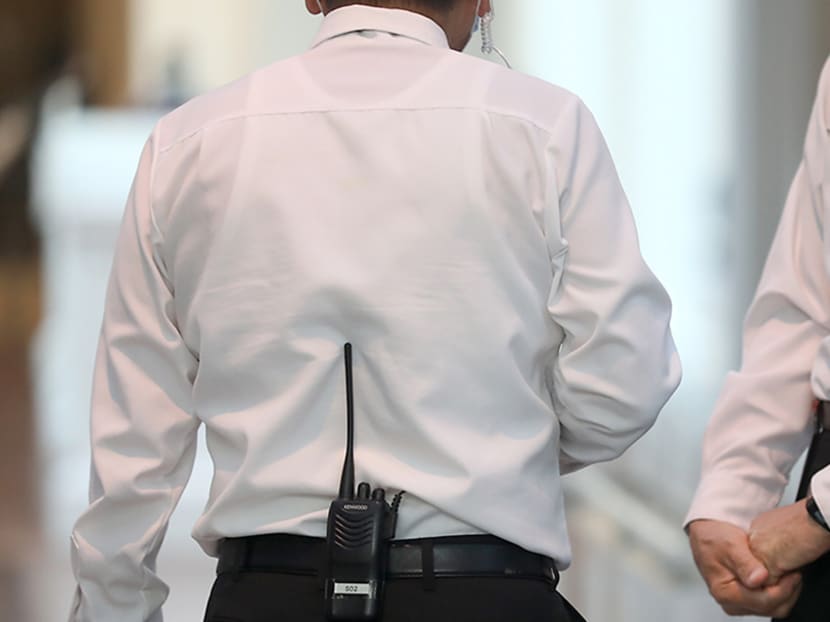MPs suggest security officers should wear body cameras, as new laws are passed to further protect them from abuse
SINGAPORE — Several Members of Parliament (MP) have suggested that the authorities make the wearing of body cameras a requirement for security officers as a form of safeguard against potential abuse, as they debated on proposed legislation that seeks to give them more protection.

Anyone found guilty of intentionally causing harassment, alarm or distress to security officers may be jailed up to a year and fined up to S$5,000.
- Members of Parliament have suggested that body-worn cameras be a requirement for security officers
- They also made other suggestions, such as having rest areas for security officers
- Parliament was debating new laws that aim to give them more protection against abuse
- One Nominated MP said that discriminatory clauses in service contracts between security companies and service buyers need to be addressed
SINGAPORE — Several Members of Parliament (MP) have suggested that the authorities make the wearing of body cameras a requirement for security officers as a form of safeguard against potential abuse, as they debated on proposed legislation that seeks to give them more protection.
Mr Desmond Tan, Minister of State for Home Affairs, said that the decision for security officers to wear body cameras is between the security company and the organisation to which it renders its services.
"These are issues that should be discussed by the service buyer and service provider, taking into account various factors such as the needs of the buyer, the deployment locations, as well as the costs involved," he said.
He added that the Ministry of Home Affairs has strongly encouraged the industry to make use of technology such as body-worn cameras to help with investigations into allegations of abuse, and more security agencies are doing so.
“Between 2019 and 2021, the police approved 43 requests made by 15 licensed security agencies for the use of body-worn cameras at various deployment sites for their security officers.”
Mr Tan was responding to these suggestions as Parliament voted to pass laws that would allow for penalties to be imposed on people who harass, assault or hurt security officers.
As part of the amendments to the Private Security Industry Act, offences against the abuse of security officers were created, and they carry harsher penalties compared with similar acts committed against general members of the public.
For example, someone found guilty of intentionally causing harassment, alarm or distress to security officers may be jailed up to a year and fined up to S$5,000, while those who commit such offences against members of the public may be jailed for up to half a year and fined up to S$5,000.
Among several proposals put forth by MPs during the debate, the use of body-worn cameras was frequently mentioned.
Radin Mas MP Melvin Yong said that abusive incidents involving security officers usually lack clear evidence, and body-worn cameras would help the officers take abusers to task.
“These cameras have been shown to be effective in breaking the deadlock, allowing organisations and individuals to report incidents with confidence,” he added.
Mr Darryl David, MP for Ang Mo Kio Group Representation Constituency (GRC), suggested that the Government can also set minimum standards for rest areas for security officers, to which Mr Tan said that it is unable to do so “due to practical infrastructure constraints of certain premises”.
Mr Wan Rizal, MP for Jalan Besar GRC, also asked whether a whistleblowing channel could be set up for security officers to report abuse incidents.
In response, Mr Tan said that they can either make a police report, or send an email to the Security Industry Council, where cases would be attended to by the Union of Security Employees.
Nominated MP Raj Joshua Thomas said that since most security officers are working for a service buyer that is not their direct employer, one of the biggest problems contributing to putting these workers in a vulnerable position are clauses affecting their employment in service contracts.
“I do not exaggerate when I say that most, if not all, outsourced services contracts contain some form of discriminatory clauses or immediate removal clauses.
“These (come) with unfettered discretion given to managing agents or security buyers to decide to reject officers deployed to a site or to demand that they be removed immediately,” he added.
Many security officers end up taking up non-security functions requested by the service buyers, because they are afraid of being dismissed if they refuse.
Mr Thomas said that new legislation should prevent managing agents or service buyers from demanding the immediate removal of security officers at site, and that there should be a proper mechanism for such requests, with opportunities for the security officers to appeal.
Last month, TODAY reported that the Security Association Singapore had hit out at a service buyer, Savills Property Management, which manages a condominium in Bukit Batok. It had put out a tender for security guards containing discriminatory clauses.
The authorities later said that they are reviewing the privileges given to Savills Property Management to hire work pass holders, after four complaints have been made so far this year against it for being discriminatory when hiring security workers.











